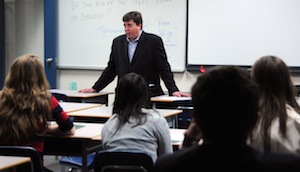 Our grade 10 and 11 students are eagerly participating in Career Day this week. It’s something we have done for a long time—long enough for the ground to have actually shifted from under our feet. It has always made sense for students to aspire to traditional professions: lawyer, doctor, engineer. However, the concept of career has changed and fragmented a great deal in the past decade. Young people should no longer expect a long career with a single firm or institution. Change and transience are now the norm. We have also learned a lot from university dropouts, Bill Gates and Steve Jobs, that has shattered well-entrenched notions of success.
Our grade 10 and 11 students are eagerly participating in Career Day this week. It’s something we have done for a long time—long enough for the ground to have actually shifted from under our feet. It has always made sense for students to aspire to traditional professions: lawyer, doctor, engineer. However, the concept of career has changed and fragmented a great deal in the past decade. Young people should no longer expect a long career with a single firm or institution. Change and transience are now the norm. We have also learned a lot from university dropouts, Bill Gates and Steve Jobs, that has shattered well-entrenched notions of success.
With the development of the Internet, businesses, governments and learning institutions can now communicate directly with potential clients. Ingenuity and new digital tools have essentially redefined the world of work. Yes, there is still a need for traditional professions. However, even those professions are having to adapt.
As we move forward, noted Harvard educator Tony Wagner in his book, The Global Achievement Gap, stresses that it is now less about preparing for a specific profession and more about teaching and refining the following core skills:
- Critical Thinking and Problem Solving
- Collaboration across Networks
- Agility and Adaptability
- Initiative and Entrepreneurialism
- Effective Oral and Written Communication
- Accessing and Analyzing Information
- Curiosity and Imagination
—Christopher Shannon, Headmaster
